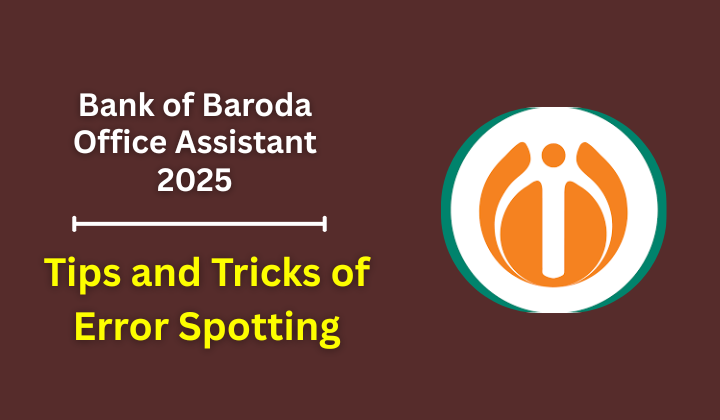Error spotting is a scoring topic in the Bank of Baroda Office Assistant exam that checks your basic grammar skills. To perform well, you must know key grammar rules like subject-verb agreement, tenses, articles, and prepositions. In this article, we cover Error Spotting Tips and Tricks for Bank of Baroda Office Assistant 2025 to help you quickly identify and correct errors in sentences.
Error Spotting Tips and Tricks
Error Spotting is an important part of English language questions in bank exams. It tests your ability to find grammatical mistakes in a sentence. A good understanding of basic grammar rules and sentence structure is essential to score well in this section. Here are some tips and tricks.
Revised Basics of Grammar
A strong foundation in English grammar is crucial. Focus on rules related to:
- Parts of Speech: Nouns, pronouns, adjectives, adverbs, verbs, prepositions, conjunctions, and interjections. Understand how each functions in a sentence. For example, knowing the difference between an adjective and an adverb is key to spotting errors like “The horse looked beautifully” (incorrect) vs “The horse looked beautiful” (correct).
- Pronouns: Ensure pronouns agree with their nouns in number, gender, and person. Also, understand cases (subjective, objective, possessive), e.g., “My father doesn’t approve of me dancing” (incorrect – should be “my dancing”).
- Prepositions: Pay attention to the correct use of prepositions in different contexts (on, in, at, to, etc.).
- Conjunctions: Understand how conjunctions connect words, phrases, or clauses (and, but, or, though, yet, etc.). Be aware of incorrect pairings like “Though he is rich but he is kind” (incorrect – should be “yet” instead of “but”).
- Tenses: Ensure verbs agree with the time frame of the sentence (past, present, future). Watch out for inconsistencies, e.g., “She was my class teacher and she didn’t go to school yesterday” (incorrect – should be “didn’t go”).
- Articles: Correct usage of ‘a’, ‘an’, and ‘the’. Remember ‘an’ is used before vowel sounds, e.g., “an MBA”, not “a MBA”.
- Subject-Verb Agreement: The verb must agree in number (singular or plural) with its subject. For instance, “The spectacles is missing” (incorrect) vs. “The spectacles are missing” (correct).
- Vocabulary: While grammar is key, a good vocabulary helps in understanding the context and identifying errors related to the wrong word usage (e.g., “less” vs. “fewer”).
Tips and Tricks for Spotting Errors
- Read carefully: Read the entire sentence first to get a general sense. Sometimes the error becomes apparent in the first reading itself.
- Break it down: If the sentence is long, try breaking it into parts and analyze each part for potential errors.
- Focus on common errors: Be aware of error types that frequently appear in bank exams:
- Subject-verb agreement: As mentioned earlier.
- Incorrect tense: Watch for shifts in tense without reason.
- Misplaced modifiers: Ensure that descriptive words or phrases are clearly linked to what they modify. For example, “Covered in mud, the child’s mother scolded him” is incorrect because it sounds like the mother was covered in mud.
- Parallelism: Elements in a list or comparison should have a similar grammatical structure.
- Wrong use of articles, prepositions, conjunctions, pronouns.
- Errors in comparisons: Ensure comparisons are complete and logical (using ‘than’ for degree).
- Use of ‘fewer’ vs. ‘less’: ‘Fewer’ for countable nouns, ‘less’ for uncountable.
- Look for keywords: Certain words often signal specific grammatical rules. For example, “each,” “every,” “neither/nor,” “either/or” often indicate singular verbs. Superlatives (“best,” “worst,” etc.) are usually preceded by “the.”
- Check for logical consistency: Sometimes, even if the grammar seems correct, the sentence might convey an illogical meaning, indicating an error in word choice or context.
- Don’t assume “No Error”: If you’re unsure, don’t automatically choose “No Error.” Carefully re-read the sentence, focusing on potential problem areas.
- Practice regularly: The more you practice, the better you’ll become at identifying errors quickly. Solve exercises from previous bank exams and mock tests.
How to Improve Your Error Spotting Skills
- Read extensively: Reading books, newspapers, and articles will expose you to correct sentence structures and improve your intuitive understanding of grammar.
- Analyze your mistakes: When you get an error spotting question wrong, understand why it was wrong. Review the relevant grammar rule.
- Focus on weak areas: Identify the types of grammatical errors you struggle with the most and dedicate extra time to understanding those concepts.
- Take mock tests: This will help you get familiar with the exam pattern and time constraints. Analyze your performance in these tests to track your progress.




 RBI Bank Assistant Vacancy 2026 Out, Che...
RBI Bank Assistant Vacancy 2026 Out, Che...
 RBI Assistant Notification 2026 Out for ...
RBI Assistant Notification 2026 Out for ...
 Daily Current Affairs Quiz 17th February...
Daily Current Affairs Quiz 17th February...








